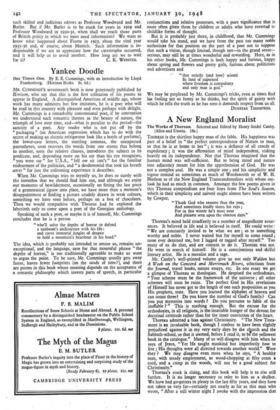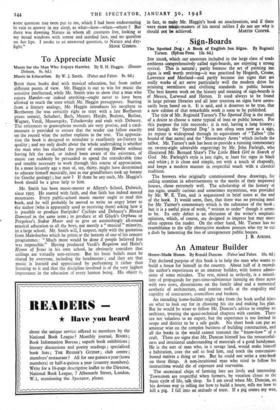A New England Moralist
The Works of Thoreau. Selected and Edited by Henry Seidel Canby. (Allen and Unwin. 18s.) THOREAU is the shirtless happy man of the fable. His happiness was part of a belief in " the perfect correspondence of Nature to man, so that he is at home to her " ; it was a defiance of all creeds of expediency ; it was the affirmation of mind independent, staking heavily on its independence. Not that Thoreau imagined that the human mind was self-sufficient. But to bring .mind and nature into adjacency meant for him the apprehension of God. He was not a complex soul. He was a simple one • and his simplicity and vigour remind us sometimes as much of Wordsworth or of W. H. Hudson as of the New England Transcendentalists with whose out- look he had so much in common. Amongst the few poems given in this Thoreau compendium are four lines from The Soul's Season, which in their simplicity and naiveté might almost have been written by Cowper.
" Thank God who seasons thus the year,
And sometimes kindly slants his rays ; ' For in this winter he's most near And plainest seen upon the shortest days."
Thoreau's mind held steadfastly to a number of magnificent assur- ances. It believed in life and it believed in itself. He could write: " We are constantly invited to be what we are ; as to something worthy and noble. I never waited but for myself to come round ; none ever detained me, but I lagged or tagged after myself." Too many of us do that, and are content to do it. Thoreau was not. He went in search of himself. He is a conscientious and skilful literary artist. He is a moralist and a sage.
Mr. Canby's well-printed volume give us not only Walden but A Week on the Concord and Merrimack Rivers, selectiona from the Journal, travel books, nature essays, etc. In one essay we get a glimpse of Thoreau as theologian. He despised the orthodoxies. " Your scheme must be the framework of the universe ; all other schemes will soon be ruins. The perfect God in His revelations of Himself has never got to the length of one such proposition as you His prophets, state. Have you learned the alphabet of heaven and can count three? Do you know the number of God's family? Can you put mysteries into words ? Do you presume to fable of the ineffable ? " This is scathing enough. But the excuse for the orthodoxies, in all religions, is the insatiable hunger of the devout for doctrinal certitude rather than for the inner conviction of the heart.
Thoreau admitted a bias against Christianity. " The New Testa- ment is an invaluable book, though I confess to have been slightly prejgcliced against it in my very early days by the lurch and the Sabbath-school, so that it seemed, before I read it; to be the yellowest book in the catalogue." Many of us will disagree with him when he says of Jesus, " Yet He taught mankind but imperfectly how to live ; His thoughts were all directed towards another world." Were they ? We may disagree even more when he says, " A healthy man, with steady employment, as wood-chopping at fifty cents a cord, and a camp in the woods, will not be a good subject for Christianity."
Thoreau's stock is rising, and this book will help it to rise still further. It is no longer necessary to refer to him as a skulker. We have had go-getters in plenty in the last fifty years, and they have not taken us very far—certainly not nearly as far as this man who wrote, " After a still winter night I awoke with the impression that
some question naa been put to me, which I had been endeavouring, in vain to answer in my sleep, as what—how—when—where ? But there was dawning Nature in whom all creatures live, looking at my broad windows with serene and satisfied face, and no question on her lips. I awoke to an answered question, to Nature and day-



































 Previous page
Previous page